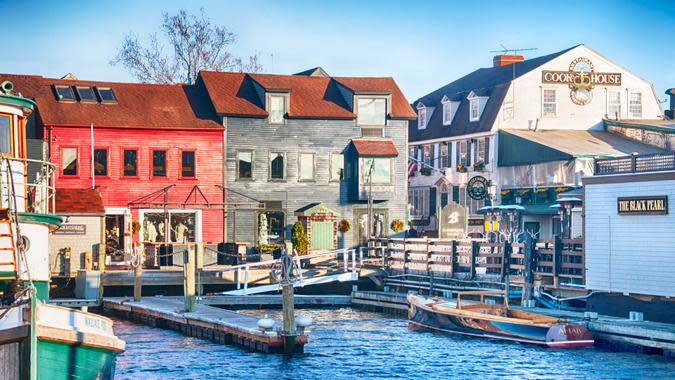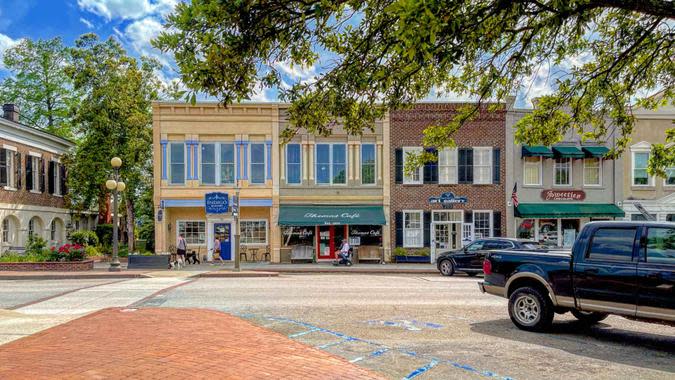If you live on the East Coast and have concerns about a potential recession, you’ll need a substantial amount of money in your emergency fund. A recent GOBankingRates study analyzing how much cash needs to be in your emergency fund revealed East Coast residents need anywhere from $11,000 to $19,000 to cover up to three months’ worth of expenses during a recession. And the amount needed only goes up from there for six, nine and 12 months.
Find Out: What Is the Estimated Median Income for the Upper-Middle Class in 2025?
Read Next: 4 Low-Risk Ways To Build Your Savings in 2025
Here’s how much you’d need in cash to survive a recession on the East Coast.

Connecticut
Annual cost of living: $59,423
Emergency fund for 3 months: $14,856
Emergency fund for 6 months: $29,712
Emergency fund for 12 months: $59,423
Learn More: Here’s the Minimum Net Worth To Be Considered Upper Class in Your 50s
See Next: What Salary Single People Need To Live Comfortably in 100 Major US Cities
Trending Now: Suze Orman’s Secret to a Wealthy Retirement–Have You Made This Money Move?

Delaware
Annual cost of living: $53,343
Emergency fund for 3 months: $13,336
Emergency fund for 6 months: $26,671
Emergency fund for 12 months: $53,343
For You: Here’s the Minimum Salary Required To Be Considered Upper-Middle Class in 2025

Florida
Annual cost of living: $53,687
Emergency fund for 3 months: $13,422
Emergency fund for 6 months: $26,843
Emergency fund for 12 months: $53,687

Georgia
Annual cost of living: $47,888
Emergency fund for 3 months: $11,972
Emergency fund for 6 months: $23,944
Emergency fund for 12 months: $47,888

Maine
Annual cost of living: $55,360
Emergency fund for 3 months: $13,840
Emergency fund for 6 months: $27,680
Emergency fund for 12 months: $55,360
View Next: Salary Needed To Achieve the American Dream in the 50 Largest Cities

Maryland
Annual cost of living: $57,444
Emergency fund for 3 months: $14,361
Emergency fund for 6 months: $28,722
Emergency fund for 12 months: $57,444

Massachusetts
Annual cost of living: $77,544
Emergency fund for 3 months: $19,386
Emergency fund for 6 months: $38,772
Emergency fund for 12 months: $77,544

New Hampshire
Annual cost of living: $62,536
Emergency fund for 3 months: $15,634
Emergency fund for 6 months: $31,268
Emergency fund for 12 months: $62,536
Try This: 9 Things the Middle Class Should Consider Downsizing To Save on Monthly Expenses

New Jersey
Annual cost of living: $66,926
Emergency fund for 3 months: $16,732
Emergency fund for 6 months: $33,463
Emergency fund for 9 months: $66,926

New York
Annual cost of living: $59,403
Emergency fund for 3 months: $14,851
Emergency fund for 6 months: $29,701
Emergency fund for 12 months: $59,403

North Carolina
Annual cost of living: $48,054
Emergency fund for 3 months: $12,014
Emergency fund for 6 months: $24,027
Emergency fund for 12 months: $48,054
Discover More: How Much You Need To Earn To Be Upper Middle Class in Every State

Rhode Island
Annual cost of living: $61,901
Emergency fund for 3 months: $15,475
Emergency fund for 6 months: $30,950
Emergency fund for 12 months: $61,901

South Carolina
Annual cost of living: $45,362
Emergency fund for 3 months: $11,341
Emergency fund for 6 months: $22,681
Emergency fund for 9 months: $45,362

Virginia
Annual cost of living: $53,677
Emergency fund for 3 months: $13,419
Emergency fund for 6 months: $26,839
Emergency fund for 12 months: $53,677
Methodology: For this study, GOBankingRates analyzed each state to find the amount needed for an emergency fund. The cost of living was determined using data from Missouri Economic and Research Information Center, the Bureau of Labor Statistics Consumer Expenditure Survey, Zillow Home Value Index and the Federal Reserve. All data was collected on and is up to date as of April 21, 2025.
More From GOBankingRates
I’m a Realtor: This Is Why No One Wants To See Your Home
3 Things Retirees Should Stop Buying To Save Money Amid Tariffs
How Middle-Class Earners Are Quietly Becoming Millionaires — and How You Can, Too
7 Wealth-Building Shortcuts Proven To Add $1K to Your Wallet This Month
This article originally appeared on GOBankingRates.com: Here’s How Much Cash You Need Stashed To Survive a Recession on the East Coast


